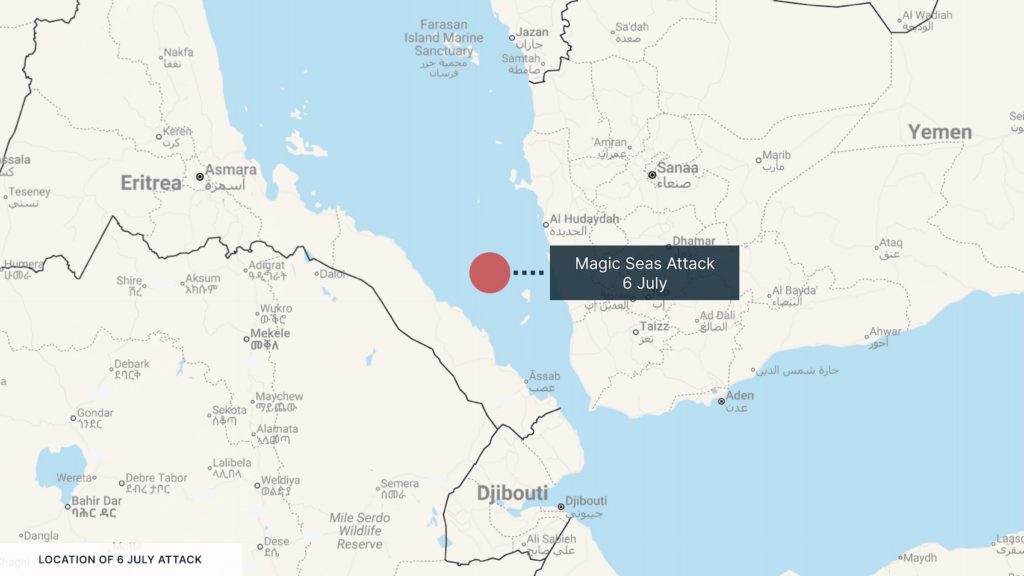Alert+
Evacuations from High-Risk Locations Call +44 (0)1202 308810 or Contact Us →
Houthis Strike Bulk Carrier in Major Red Sea Attack
Intelligence cut off: 11:00 BST 07 JULY 2025
On 6 July, the Liberia-flagged Greek-owned dry bulk carrier MAGIC SEAS (IMO: 9736169) was attacked 51NM southwest of Al Hudaydah, Yemen. The attack was almost certainly conducted by the Yemen-based Houthi Movement (officially ‘Ansar Allah’).
At 1125 UTC, the vessel reported being engaged by multiple small vessels (reportedly eight to nine skiffs), which opened fire on MAGIC SEAS with automatic firearms and rocket-propelled grenades (RPGs). The vessel’s Armed Security Team (AST) returned fire. At 1401 UTC, the Company Security Officer (CSO) reported that the vessel had been struck by ‘unknown projectiles’, resulting in a fire onboard. Following engagement with the skiffs, the vessel was reportedly attacked by four Uncrewed Surface Vehicles (USVs), two of which impacted the port side of the vessel, and two of which were “intercepted and destroyed by the AST”.

An executive affiliated with the shipping company which owns the MAGIC SEAS stated that the vessel was also targeted by missiles, which started fires in the forecastle near the ship’s bow and in its second hold, damaging the vessel’s fuel tanks and hitting the engine room. At 1530 UTC, the CSO reported that the crew were preparing to abandon ship, with all crew having abandoned ship by 1553 UTC. The crew were confirmed as rescued by a passing merchant vessel at 1900 UTC. The vessel remains abandoned and is taking on water.
Hours after the attack, the Israeli Air Force (IAF) conducted multiple airstrikes against Houthi targets in Al Hudaydah, Ras Isa and Salif in Yemen. The IAF also reportedly targeted the GALAXY LEADER (IMO: 9237307), which was hijacked by the Houthis in late 2023.
It is almost certain that the GALAXY LEADER was struck due to long-standing concerns that the vessel has been used as an intelligence, surveillance and reconnaissance (ISR) asset, with the Israeli military having previously stated that the Houthis had installed a radar system on the vessel to track vessels in the region following multiple strikes on the Houthi’s coastal radar infrastructure.
INTELLIGENCE ANALYSIS
Houthis Launch First Ship Attack Since US Ceasefire Deal
The incident is the first Houthi attack against a merchant vessel since December 2024. Following the signing of a ceasefire agreement between the US and the Houthis on 6 May, some merchant vessel operators had resumed transiting the Red Sea and Gulf of Aden. However, the attack against MAGIC SEAS, almost certainly highlights the continuing threat to merchant vessels, and there is a realistic possibility that the Houthis will follow up the success of the attack with further attacks in the near future.
The brief Gaza ceasefire between Israel and Hamas between January and March led to the Houthi movement announcing an end to attacks against merchant vessels that are not directly affiliated with Israel. However, the Houthis announced a resumption of the anti-merchant shipping campaign after the end of the ceasefire, with the US and Israel then regularly conducting air strikes against Houthi-controlled Yemen. The Houthis, however, did not attack any merchant shipping during this period, despite sustained threats.
The US involvement in strikes against Iran’s nuclear facilities in Operation Midnight Hammer in June led to a member of the Houthi politburo announcing an end to the ceasefire with the US, and it is likely that the attack against MAGIC SEAS is intended as strategic messaging of a renewal of the Houthi anti-merchant shipping campaign.
MAGIC SEAS was transiting between China and Turkey. However, the shipowner, Allseas Marine, has at least three other vessels that have previously made port calls in Israel. In a statement published after the attack, the Houthis claimed that the vessel “meets the Yemeni criteria for targeting ships”. It is unclear at the time of the writing whether this is due to the vessel owners having conducted business in Israel – given the ambiguity of Houthi statements and the previously indiscriminate nature of Houthi attacks, all merchant vessels transiting near Yemen should consider themselves a potential target.
The Tactics, Techniques and Procedures (TTPs) employed during the attack stand out for both the scale and diversity of attack methods. While the Houthis have previously used skiffs during attacks, the number used during this attack is particularly large. It is highly likely that the ISR capabilities of the Houthis have been significantly degraded following the withdrawal of Iranian assets from the region and US-Israeli strikes. The Houthis likely used the large group of skiffs to enable the targeting of the vessel with other weapon systems such as USVs and missiles. It is almost certain, given the attack methods, that the Houthis intended to sink the vessel.
Travel Risk Advice
- Vessel operators transiting the Red Sea, Bab al-Mandeb and Gulf of Aden should consider the use of an AST. ASTs should be positioned to cover all avenues of approach.
- Vessel operators should conduct thorough pre-voyage risk assessments.
- Vessels should have well-rehearsed plans and protocols for emergency response to security incidents.
- Vessel operators should enhance visual and radar watch 24/7 from the southern Red Sea through the Gulf of Aden. Effective and properly equipped lookouts should be stationed at all times.
- Vessels operating in the region should consider suspending broadcasting on AIS.
- Vessels should limit transits to daylight hours where possible.
- Vessels should limit other electronic signatures and minimise non-essential transmissions to limit detection, identification and targeting.
- Vessel operators should consider alternative routes due to the threat of renewed Houthi operations targeting merchant vessels. All vessels or shipping companies with clear links to Israel should consider rerouting.
- Vessels should maintain contact with authorities like the UKMTO and immediately report on any suspicious activity.
- For further counter-measures, vessel operators should consult authoritative sources such as the BMP Maritime Security guide.
- Monitor the Solace Secure platform and trusted local media for updates relevant to the conflict.

Intelligence Lite
Free
- Weekly Intelligence Email with Key Events
- Alert+ Situation Summary for Immediate Incidents
- Quarterly Global Election Report (Lite Version)
- Yearly Global Risk Outlook (Lite Version)
Intelligence Plus
Full Subscription
- Weekly Global Intelligence (Full Report)
- Alert+ Reports (Summary and Full Analysis)
- Quarterly Live Q&A Webinar with Intelligence Team
- Quarterly Global Election Report (Full Report)
- Yearly Global Risk Outlook
- Ongoing Thematic & Regional Deep Dive Reports
- On-demand Pre-Travel Advisories (2 reports per year)
Subscribe to receive full reports
Join the thousands of risk management professionals that rely on our intelligence every week.
Includes 70+ reports written by expert analysts.
Subscribe